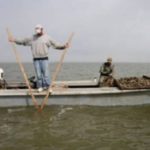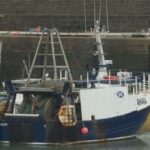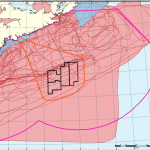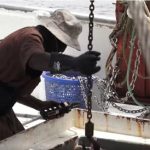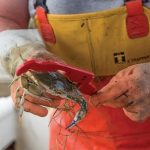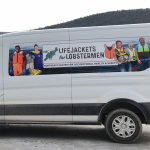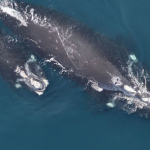Daily Archives: December 1, 2016
RI Seafood brand catching on!
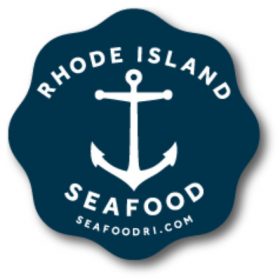 – Four years of meetings with fishermen, tourism and commerce representatives, scientists, fish processors, health department officials, chefs and restaurants owners to develop and implement a Rhode Island Seafood brand (seal) is starting to catch on. There’s no doubt in my mind that it will pay off with big dividends for the fishing industry and tourism in Rhode Island. Ultimately it is (and will be) a big shot in the arm for RI’s economy. However, the big winners of this branding initiative will be Rhode Islanders. We get to dine out or eat at home more seafood that is grown and/or landed in Rhode Island as that is what the RI Seafood label means. Look for the RI Seafood label and you know the fish was grown and/or landed in Rhode Island. Presenter after presenter at the Seafood Marketing Collaborative meeting shared success stories about implementing the RI Seafood brand. Highlights included: A very successful Calamari Cook-Off in Narragansett in September where a 1,000 pounds of fresh Rhode Island calamari (donated by the industry) was prepared by area restaurants and chefs with thousands of people in attendance. RI lands more squid that any other port in the nation. Read the rest, including some EBM, click here 22:29
– Four years of meetings with fishermen, tourism and commerce representatives, scientists, fish processors, health department officials, chefs and restaurants owners to develop and implement a Rhode Island Seafood brand (seal) is starting to catch on. There’s no doubt in my mind that it will pay off with big dividends for the fishing industry and tourism in Rhode Island. Ultimately it is (and will be) a big shot in the arm for RI’s economy. However, the big winners of this branding initiative will be Rhode Islanders. We get to dine out or eat at home more seafood that is grown and/or landed in Rhode Island as that is what the RI Seafood label means. Look for the RI Seafood label and you know the fish was grown and/or landed in Rhode Island. Presenter after presenter at the Seafood Marketing Collaborative meeting shared success stories about implementing the RI Seafood brand. Highlights included: A very successful Calamari Cook-Off in Narragansett in September where a 1,000 pounds of fresh Rhode Island calamari (donated by the industry) was prepared by area restaurants and chefs with thousands of people in attendance. RI lands more squid that any other port in the nation. Read the rest, including some EBM, click here 22:29
Increase in humpback whales in B.C. waters results in record number of entanglements
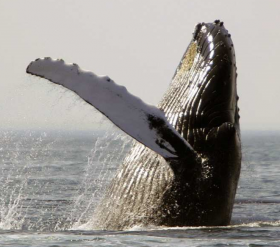 Paul Cottrell, marine mammal coordinator with the federal fisheries department, has received reports of a record 22 whale entanglements in the province so far this year, including 21 humpbacks and one grey whale. In a typical year there are 10 to 15. “It’s a very unfortunate series of incidents,” Cottrell said Thursday. “We’re interested in investigating to find out what happened and what can be done to prevent it going forward.” Humpbacks have been recovering steadily since the era of commercial whaling but have been observed in unusually high numbers off B.C. this year. They are also staying longer before migrating to breeding and calving grounds in Hawaii and Mexico. “It’s amazing the number of humpbacks we’re seeing in inshore waters,” Cottrell said. “Southern Alaska is seeing a lot fewer humpbacks this year so they may have shifted to our area. Their entanglements are drastically down.” Read the rest here 19:59
Paul Cottrell, marine mammal coordinator with the federal fisheries department, has received reports of a record 22 whale entanglements in the province so far this year, including 21 humpbacks and one grey whale. In a typical year there are 10 to 15. “It’s a very unfortunate series of incidents,” Cottrell said Thursday. “We’re interested in investigating to find out what happened and what can be done to prevent it going forward.” Humpbacks have been recovering steadily since the era of commercial whaling but have been observed in unusually high numbers off B.C. this year. They are also staying longer before migrating to breeding and calving grounds in Hawaii and Mexico. “It’s amazing the number of humpbacks we’re seeing in inshore waters,” Cottrell said. “Southern Alaska is seeing a lot fewer humpbacks this year so they may have shifted to our area. Their entanglements are drastically down.” Read the rest here 19:59
Halibut stock stable, flat harvest likely
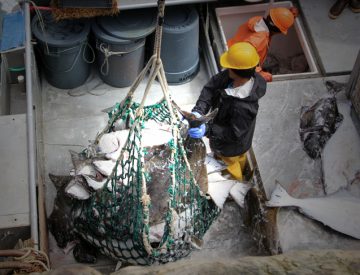 Stocks have stabilized and bycatch is as low as it’s been since 1960, however the halibut quota for next year will edge down after being raised for the first time in years in 2016. The International Pacific Halibut Commission held its interim meeting in Seattle Nov. 29-30 to review the 2016 catch, status of the stock, and to recommend how much halibut fishermen will be able to take in 2017. Overall, biologists and managers gave a view of a responsible group of users responding well to a trough in the historical ups and downs of halibut abundance, which has flattened after a decade of downward movement. IPHC biologist Dr. Ian Stewart painted a more secure picture of halibut than the last two years have seen, emphasizing decreased bycatch and a firm outlook for abundance. “I think it’s pretty clear that we’ve seen the stock stabilize,” Stewart said. Read the story here 15:42
Stocks have stabilized and bycatch is as low as it’s been since 1960, however the halibut quota for next year will edge down after being raised for the first time in years in 2016. The International Pacific Halibut Commission held its interim meeting in Seattle Nov. 29-30 to review the 2016 catch, status of the stock, and to recommend how much halibut fishermen will be able to take in 2017. Overall, biologists and managers gave a view of a responsible group of users responding well to a trough in the historical ups and downs of halibut abundance, which has flattened after a decade of downward movement. IPHC biologist Dr. Ian Stewart painted a more secure picture of halibut than the last two years have seen, emphasizing decreased bycatch and a firm outlook for abundance. “I think it’s pretty clear that we’ve seen the stock stabilize,” Stewart said. Read the story here 15:42
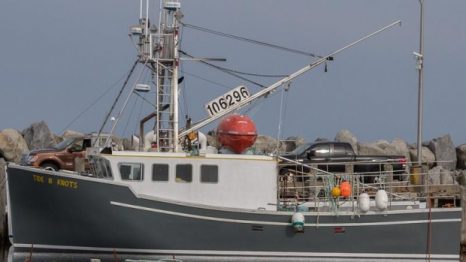
UPDATED: Vessel Safe in Yarmouth Harbor – Pump dropped to fishing boat taking on water off Yarmouth
A Hercules aircraft has dropped a pump to a 13-metre fishing vessel taking on water off Yarmouth, N.S., and the situation is “stable,” according to the military’s Joint Task Force Atlantic. Canadian Navy Lt. Len Hickey said a call to the Joint Rescue Coordination Centre came in around 8:30 a.m. AT about the fishing vessel Tide ‘N Knots taking on water about 32 kilometres off the coast. The Hercules, along with a Cormorant helicopter and several Canadian Coast Guard vessels have been dispatched to the scene to help. There’s no word on how many people are on the vessel or whether anyone has been injured, though Hickey underscored the situation is “stable.” Read the rest here. Another report confirms there are five fishermen aboard. Read that here 15:00
Decisions coming soon on Columbia salmon reforms
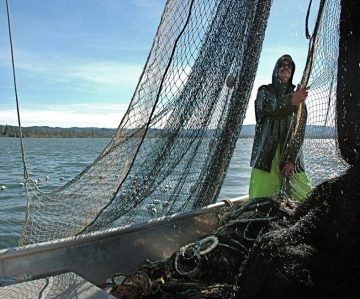 The Washington and Oregon fish and wildlife commissions will decide in the next two months whether to implement fully in 2017 the biggest overhaul of Columbia River salmon policies in seven decades. Reforms adopted by both states in early 2013 allocated more chinook salmon to sportsmen in the main Columbia and restricted gillnetting to off-channel sites like Youngs Bay near Astoria. The reforms also called for commercial fishing that remained in the main Columbia to be done with live-capture methods — such as purse seines and beach seines — designed to harvest hatchery stocks and release wild fish. The reforms had a four-year transition period, which ends Dec. 31. Full implementation was to begin on Jan. 1. But, there have been issues during the 2013-2016 transition period. The effort to stock more chinook and coho in off-channel spots, and development of new off-channel places, has met with some success, but failures, too. Testing of beach and purse seines in the main Columbia have found much higher mortality rates of released fish than anticipated four years ago. Read the rest here 12:38
The Washington and Oregon fish and wildlife commissions will decide in the next two months whether to implement fully in 2017 the biggest overhaul of Columbia River salmon policies in seven decades. Reforms adopted by both states in early 2013 allocated more chinook salmon to sportsmen in the main Columbia and restricted gillnetting to off-channel sites like Youngs Bay near Astoria. The reforms also called for commercial fishing that remained in the main Columbia to be done with live-capture methods — such as purse seines and beach seines — designed to harvest hatchery stocks and release wild fish. The reforms had a four-year transition period, which ends Dec. 31. Full implementation was to begin on Jan. 1. But, there have been issues during the 2013-2016 transition period. The effort to stock more chinook and coho in off-channel spots, and development of new off-channel places, has met with some success, but failures, too. Testing of beach and purse seines in the main Columbia have found much higher mortality rates of released fish than anticipated four years ago. Read the rest here 12:38
Pew: Pacific Bluefin Tuna Management Proposal Will Not End Overfishing
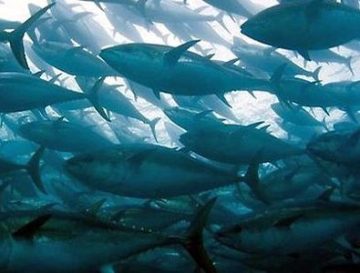 The Pacific bluefin tuna has been overfished for decades and has seen population declines of 97 percent, but a management proposal to be considered by the Western and Central Pacific Fisheries Commission (WCPFC) would not improve the status quo and must be rejected by member governments, according to The Pew Charitable Trusts. The WCPFC, which oversees the tuna fisheries of the western Pacific Ocean, meets here Dec. 5-9 to discuss management measures for Pacific bluefin. Management of the stock has long been directed by the Northern Committee, a WCPFC subcommittee; in past years, the committee’s recommendations have been approved by the full Commission with little review or discussion, much to the detriment of Pacific bluefin. (according to the Pew Charitable Trust). Amanda Nickson, who directs Pew’s global tuna conservation campaign, issued the following statement on why the WCPFC should reject its current proposal: Read the rest here 12:03
The Pacific bluefin tuna has been overfished for decades and has seen population declines of 97 percent, but a management proposal to be considered by the Western and Central Pacific Fisheries Commission (WCPFC) would not improve the status quo and must be rejected by member governments, according to The Pew Charitable Trusts. The WCPFC, which oversees the tuna fisheries of the western Pacific Ocean, meets here Dec. 5-9 to discuss management measures for Pacific bluefin. Management of the stock has long been directed by the Northern Committee, a WCPFC subcommittee; in past years, the committee’s recommendations have been approved by the full Commission with little review or discussion, much to the detriment of Pacific bluefin. (according to the Pew Charitable Trust). Amanda Nickson, who directs Pew’s global tuna conservation campaign, issued the following statement on why the WCPFC should reject its current proposal: Read the rest here 12:03
Fire Safety – So what’s the difference between one portable fire extinguisher and another? The answer might surprise you.
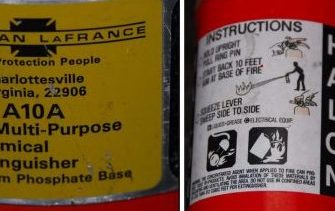 When I (Steve D’Antonio) recently asked a boatbuilder what type of portable fire extinguisher he installed aboard his boats, the response took me aback. “Does it really matter?” he asked. “Aren’t they all pretty much the same?” Given the alphabet soup by which fires and extinguishers are defined and designated (see “U.S. Fire Classifications”), his answer could be forgiven. However, there are significant differences between such designations. The U.S. Coast Guard requirements for fire extinguishers are, in my opinion, woefully inadequate and should be considered strictly an absolute minimum. A 65-foot vessel is compliant with just one portable B-II and one fixed fire extinguisher (again, I don’t recommend following this guideline). My preference is for a portable ABC unit to be installed in every cabin, along with one clean-agent extinguisher mounted amidships, typically close to the engine and electrical panel. And no fire extinguisher should be more than three steps away. Read the story here 11:22
When I (Steve D’Antonio) recently asked a boatbuilder what type of portable fire extinguisher he installed aboard his boats, the response took me aback. “Does it really matter?” he asked. “Aren’t they all pretty much the same?” Given the alphabet soup by which fires and extinguishers are defined and designated (see “U.S. Fire Classifications”), his answer could be forgiven. However, there are significant differences between such designations. The U.S. Coast Guard requirements for fire extinguishers are, in my opinion, woefully inadequate and should be considered strictly an absolute minimum. A 65-foot vessel is compliant with just one portable B-II and one fixed fire extinguisher (again, I don’t recommend following this guideline). My preference is for a portable ABC unit to be installed in every cabin, along with one clean-agent extinguisher mounted amidships, typically close to the engine and electrical panel. And no fire extinguisher should be more than three steps away. Read the story here 11:22
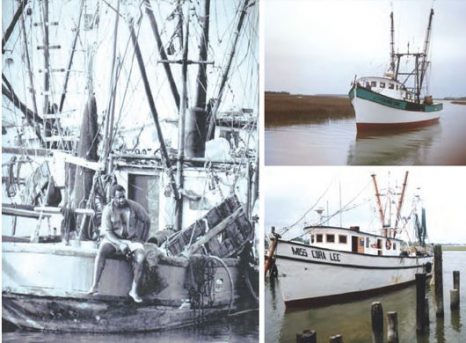
Hilton Head Fishing Co-Operative a notable piece of Lowcountry history
The phrase “life-changing” is probably over used — as well as underappreciated. Typically, when we hear this phrase, we expect to hear stories about life and death and survival and courage, and people overcoming life-threatening challenges. However, it is no exaggeration to say that all of these elements are woven into the little-known story of the Hilton Head Fishing Co-Operative, which had an enormous impact on the economy of Hilton Head Island, as well as the quality of life for many native islanders during the 1960s and ’70s. Before the co-operative, individual families relied on the waters surrounding Hilton Head as a means to sustain their way of life; it was the way families fed themselves. Looking forward to the day’s catch was no sport, because fishing provided the meals for the day. Breakfast might be shrimp and grits, lunch could be an oyster boil steamed with fresh corn from the fields, and dinner likely was rice along with the catch of the day. Interesting, well worth the read, Click here 09:05
DFO cracks down on secret fishing licence deals
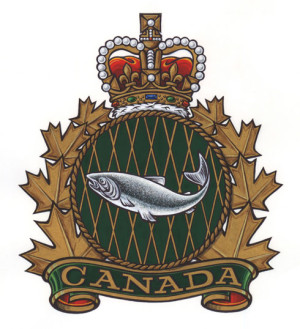 Canada’s Department of Fisheries and Oceans says it’s cracking down on so-called “controlling agreements” that result in fishermen holding a fishing licence in name only. Morley Knight, the department’s manager for the Maritimes, said five licence-compliance reviews have been completed in the region and other cases are ongoing. Controlling agreements allow individuals or corporations other than the licence holder to secretly control the use of the licence. They allow companies to get around DFO’s owner-operator policy, which is meant to ensure the independence of Atlantic Canada’s inshore fishery. Read the rest here 08:11
Canada’s Department of Fisheries and Oceans says it’s cracking down on so-called “controlling agreements” that result in fishermen holding a fishing licence in name only. Morley Knight, the department’s manager for the Maritimes, said five licence-compliance reviews have been completed in the region and other cases are ongoing. Controlling agreements allow individuals or corporations other than the licence holder to secretly control the use of the licence. They allow companies to get around DFO’s owner-operator policy, which is meant to ensure the independence of Atlantic Canada’s inshore fishery. Read the rest here 08:11

































